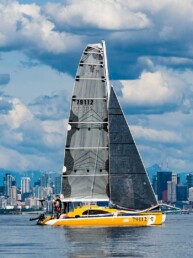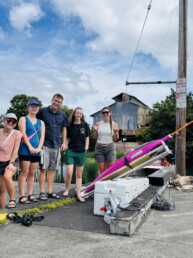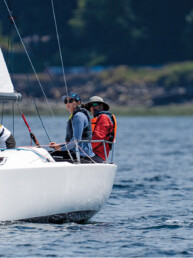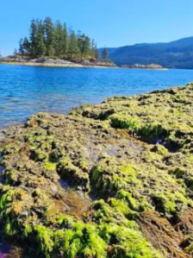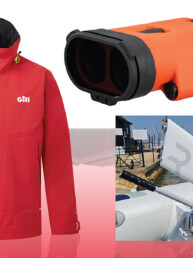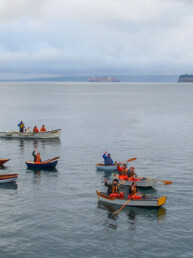To win a championship, you need to be firing on all cylinders, and you also need a lucky break or two. This was one of those weeks. Peter Isler and I won Class B on the Jeanneau SunFast 3300 Red Ruby — which I co-own with fellow Pacific Northwest sailors, Christina and Justin Wolfe — in the recent ORC Doublehanded Worlds. After making its debut last year in Sweden, this second edition of the ORC Doublehanded Worlds was sailed in Barcelona, Spain in September, with 54 boats in 3 Divisions.
The ORC Doublehanded Offshore Worlds came onto my radar when I realized we were going to ship Red Ruby to Barcelona for the Rolex Middle Sea Race in October — meaning we were going to be in the neighborhood! Long story short, I signed my usual partner Alyosha Strum-Palerm and I up for the regatta, our first under the ORC rating system (In France and the UK we race under IRC).
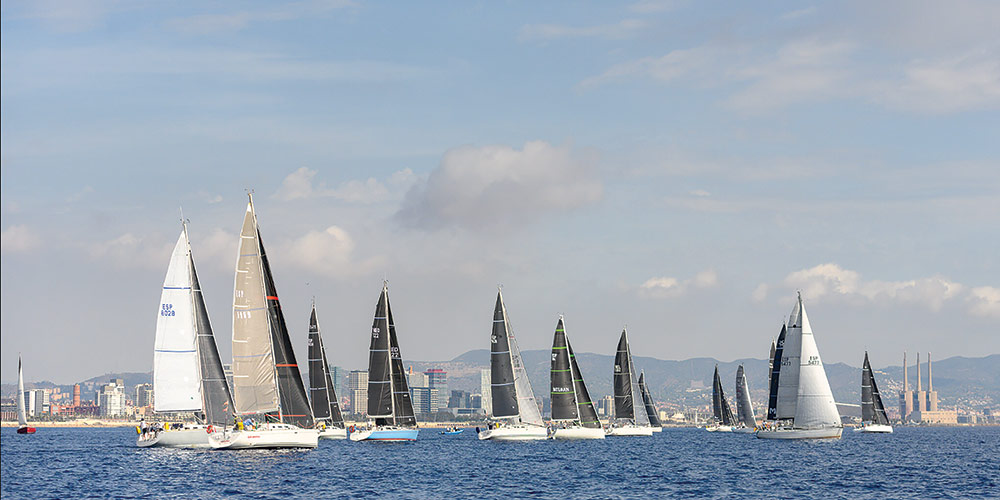
Unfortunately, Alyosha got sick right before the regatta and a kismet solution was that my longtime friend Peter Isler happened to be in Barcelona, and wanted to race with me! What an opportunity to race doublehanded with such a legend. For anyone unfamiliar, among other extraordinary accomplishments throughout his career, Peter is a two-time America’s Cup winner as navigator on Stars and Stripes — nevermind that he had never raced doublehanded, or on Red Ruby.
Despite my enthusiasm, I had lowered my expectations for the event, though they were never that high in the first place, with our IRC-style boat and the prospect of “Mediterranean conditions”, which is another way of saying light air and lots of chop. So, my mentality was “let’s just prepare as well as we can, go racing, and have some fun.”
The night before the first race, they announced the course — a 180-miler up the Costa Brava and back, with a reach out into the Mediterranean in the middle. The race started in very light air and our worst fears about our speed in these conditions seemed justified. But then, we managed to get to the left of our fleet and pick up some wind closer to the coast. From there it was a nice medium-air downwind until dark, when it puffed up to 20 knots near the Cape of Begur. The rounding mark was the Illes Medes, just past the Cape but in a bay, where the lead boats slowed down a lot. Peter was able to pick this up, since we were a few miles back from the bigger boats, and we skirted around the hole to lead our class at the turning mark. This was going better than expected!
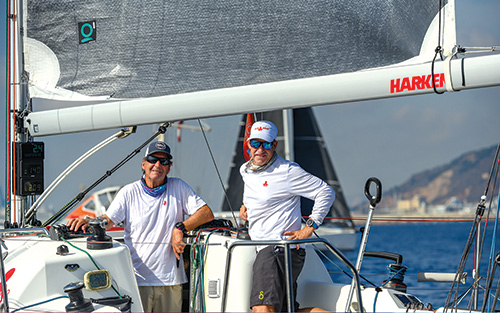
The next beam reach was dark but fast, with a J2 on the rail, genoa staysail, and full main. Twenty wet miles went by in a flash, then we were heading back to the coast on a similar angle. We hoisted the Code Zero and were really ripping for a while, until we weren’t. The breeze abruptly died, and eventually came softly from the north. We managed the transition alright and got back around the Illes Medes in 6 knots of wind. After setting the A1.5, the breeze was getting fluky, and we worked our way closer to the coast. We were rewarded with some decent land breeze for an hour or so, while the boats outside had little wind. That sort of put us in good shape with our class, with only one Figaro 2 apparently in striking distance.
Things were looking good, but we still had 50 miles to go, downwind in a fickle breeze. In the end, we found the speed to stay ahead, and the wind held until we got to the finish. Whew! Victory by over 30 minutes. We were somewhat in shock as we motored into the marina, tired but happy with our efforts, even if we got some good breaks — like an all downwind race!
After a recovery day, we got under way in the deciding Race 2, a 65-mile course. The breeze started light from the south but quickly built to 10, then 13 knots. We got a so-so start, but then got clear on port to be among the leaders after the 2-mile upwind leg. Then it was a long spinnaker reach to the seaside town of Blanes. We had a good set and sagged low to find a passing lane to leeward of the boats ahead. The boat was going fast and we ultimately got free air and into the lead. At the turning mark, the Italia 11.98 was close behind, but we had a pretty good lead on everyone else. A simple 32 mile one-tack beat to the finish in Barcelona. What could go wrong?
For the first two hours, the breeze stayed over 10 and we were going well, straight towards the finish. But then the wind began to fade, as forecast. The chop remained, and we started slowing down. The pack behind was quickly getting closer and we were passed by one boat at close range, then another. It was not looking good. Somewhat in desperation, we set the Code Zero and began footing to get closer to the coast. An hour later the wind totally died, which is when we noticed some boats right on the shore, going 5 knots! We fought extra hard to get closer to land, but had hardly a puff to work with.
Eventually we got some wind, set the kite, and held our breath for the final 5 miles to the finish. Nearly the whole fleet got the breeze just after, and most of our class were right together at the finish. However, we were just clear enough of the pack to score third for the race, and secure our overall Class B win in a fleet of 22 fellow competitors.
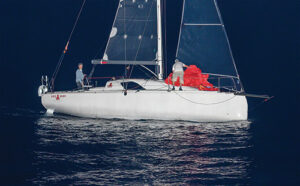
Needless to say, the end of that race in the twinkling city lights off Barcelona was a memorable but somewhat stressful time. We hung in and fought hard and, in the end, we had done just enough.
It was cool to sail with someone as smart and experienced, yet cerebral, as Peter. We trusted each other and backed each other up, as a good team does. It was a surprising result to me, but in this highly tactical racing, anything can happen, so never give up, keep trying to make good decisions, and let the chips fall where they may. Peter and I won the regatta, but full credit goes to the whole Red Ruby sailing team this year, including Chris and Justin Wolfe, Alyosha Strum-Palerm, and Carl Buchan, for making meaningful contributions to getting fast and sailing the boat well. It has been a great summer of racing!
Also making this championship rewarding was the chance to get to know some of the other competitors. Doublehanded sailors have a unique camaraderie, with their partner, but also with the other teams that share in the same joys and challenges. We hope to see some of our new friends again, they remind us why we are so passionate about this type of sailing.
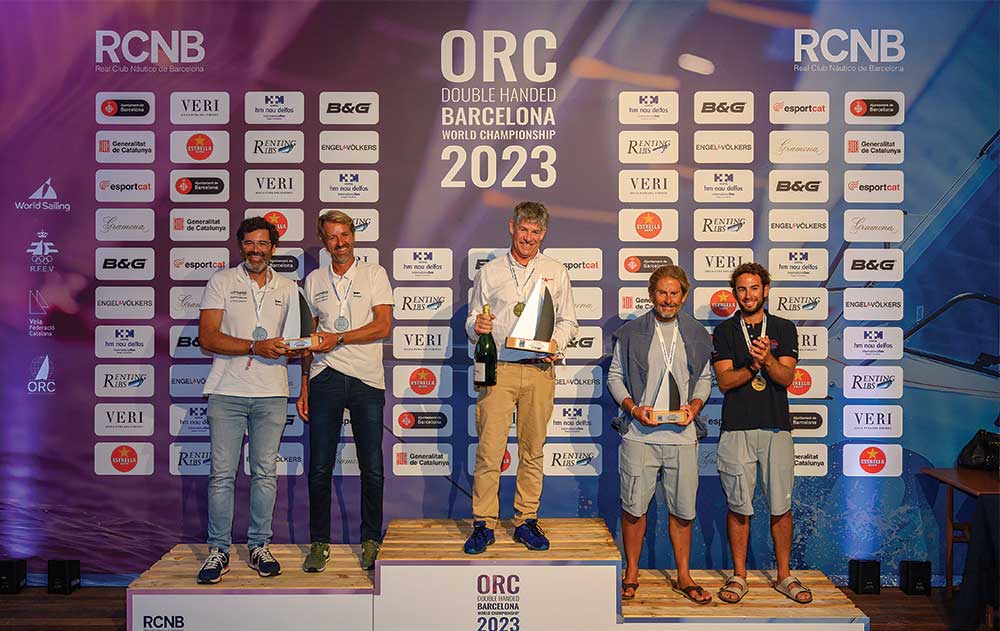
Photos by Oscar Torveo courtesy of ORC World Championship.

